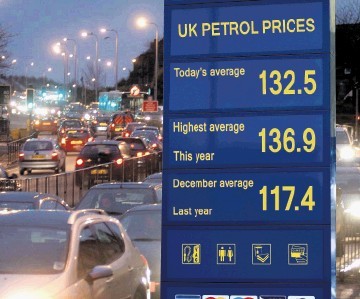
Petrol prices have fallen to their lowest level for nine months – but campaigners said last night the cost was still “strangling the economy”.
Drivers are paying on average 132.54p a litre for unleaded, a price not seen since March and down 1.16p on a month ago, according to the AA.
A Press and Journal survey, carried out yesterday, revealed petrol prices in urban areas across the north and north-east were in line with the nationwide figure.
At Morrisons petrol station in Millburn Road, Inverness, the price was 129.9p, while at BP in King Street, Aberdeen, it was 131.9p and just up the road at Shell it was 128.9p.
But the UK average price for the year as a whole – 133.83p – was 16.47p higher than the previous 12-month period.
Bill McIntosh, general secretary of the Scottish Taxi Federation, insisted the cost remained “ridiculously high”.
He added: “The oil price has dropped a fair amount, but it doesn’t seem to be passed on to motor-users. At least there has been a small drop, but nonetheless it could be cut a lot further.”
Peter Carroll, founder and organiser of Fair Fuel UK, said, while the falls were welcome, the price was still “strangling the economy”.
Kate Gibbs, a spokes-woman for the Road Haulage Association Scotland, said the drop in the average price would come as a relief, but added it was important it became a long-term trend and not a “flash in the pan”.
While urban area prices were similar, and in some cases less than the UK average, in the more remote areas of the north-east they were significantly higher.
At Moravian Motors at Buckie the price was 134.9p and at Ben Nevis Services in North Road, Fort William, it was 133.9p. The price was 135.9p at Victoria Garage at Ballater but the highest prices were found in the Western Isles and Orkney.
A litre of unleaded came in at 141.9p at the Manor Filling Station in Bayhead Street, Stornoway, and at 142.9p at the Mills Filling Station in Pickaquoy Road, Kirkwall.
Western Isles MP Angus MacNeil said too much of a weekly wage or monthly salary was still being spent on fuel.
He added: “It’s welcome that prices are falling. I hope these are being passed on to the consumers, but it remains a fact that the price of fuel is very high in the Western Isles.
“We will be looking for the differential to close when the rural fuel rebate comes into play in March. It should be a help – we have argued for it long and hard.”
Stuart Mackinnon, a spokesman for the Federation of Small Businesses Scotland, also praised the government’s plans to support rural communities.
But he said more work had to be done to achieve a long-term solution for small business-owners in general.
“It’s good they are getting some respite, but that doesn’t mean there’s not much more work to be done,” he added.
Nationwide, diesel averages at 141.15p – up from the mid-November figure of 140.95p.